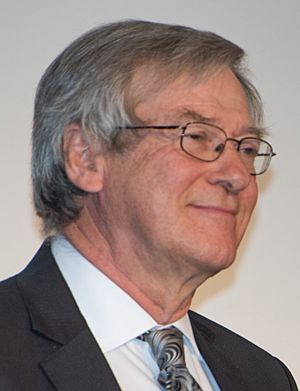Roger Blandford facts for kids
Quick facts for kids
Roger David Blandford
|
|
|---|---|

Roger Blandford in 2016.
|
|
| Born | 28 August 1949 Grantham, Lincolnshire, England
|
| Alma mater | Magdalene College, Cambridge St John's College, Cambridge Institute for Advanced Study |
| Awards | Helen B. Warner Prize (1982) Dannie Heineman Prize for Astrophysics (1998) Eddington Medal (1999) Gold Medal of the Royal Astronomical Society (2013) Shaw Prize (2020) |
| Scientific career | |
| Fields | Astronomy |
| Institutions | California Institute of Technology Stanford Linear Accelerator Center Stanford University Kavli Institute for Particle Astrophysics and Cosmology |
| Doctoral advisor | Martin Rees |
| Doctoral students |
|
Roger David Blandford (born in 1949) is a British theoretical astrophysicist. He is well-known for his important work on black holes and how they affect the universe.
Contents
Early Life
Roger Blandford was born in Grantham, England. He grew up in Birmingham, where he went to King Edward's School.
Amazing Discoveries and Work
Roger Blandford is famous for several big ideas in astrophysics. He helped explain how powerful jets of energy shoot out from black holes.
How Black Holes Power Jets
One of his most famous ideas is the Blandford–Znajek process. This explains how black holes can create strong jets. These jets are made by taking energy from a spinning black hole. Scientists used this idea to understand the jets seen around the black hole in the elliptical galaxy M87. This was when the Event Horizon Telescope first showed us a black hole's shadow.
Blandford also thought of another way jets might form. This involves strong winds that come from the swirling gas around a black hole. This gas forms a flat disk called an accretion disk.
Understanding Jet Shapes
Roger Blandford also helped create a model called the Blandford–Königl conical jet model. This model helps scientists understand the shape and light from these jets. It helps predict how they look when we observe them with radio telescopes.
Supernova Explosions
He also made important contributions to understanding supernovae. These are huge explosions that happen when stars die. He helped extend a model called the Sedov–Taylor blast wave solution. This new version, the Blandford–McKee solution, helps explain very fast and powerful supernova explosions.
Supporting Science
In 2005, Roger Blandford wrote a letter to the astronomy community. He shared his concerns about how space science was being supported in the United States. He believed it was important to keep funding scientific research.
He also led a group called Astro2010. This group helps decide which astronomy research projects in the U.S. should get funding. Their report was released in August 2010. It helped guide what scientists would study in space for the next ten years.
Important Roles
Roger Blandford is a member of many important scientific groups. These include the Royal Society and the U.S. National Academy of Sciences. He is also a professor at Stanford University. He teaches physics there and at the Stanford Linear Accelerator Center (SLAC). From 2003 to 2013, he was the director of the Kavli Institute for Particle Astrophysics and Cosmology.
Awards and Honors
Roger Blandford has received many awards for his work. These awards show how much his contributions have helped us understand the universe.
- 2020 – Elected a Legacy Fellow of the American Astronomical Society
- 2020 – Shaw Prize in Astronomy
- 2016 – Crafoord Prize
- 2013 – Gold Medal of the Royal Astronomical Society
- 1999 – Eddington Medal
- 1998 – Dannie Heineman Prize for Astrophysics
- 1982 – Helen B. Warner Prize for Astronomy

